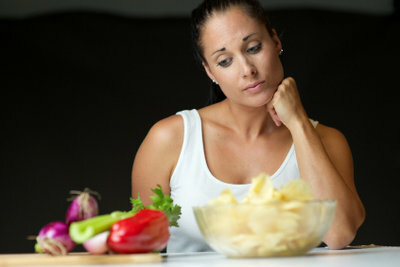What can I do about very oily skin?
An increased production of oil by the skin can have many causes, and it is often found in connection with acne, which affects over 80% of all adolescents and which persists into adulthood can. Find out here what influence our Western diet has on the complexion of the skin and what you can do against very oily skin by consistently changing your diet.

Very oily skin from Western diet
the skin is not only a mirror of our soul, but also of our diet. From a nutritional point of view, it is nothing new to have a diet adapted to the western lifestyle Has a significant impact on sebum production and can result in very oily skin.
- You boost the sebum production of your skin with foods that over-stimulate insulin secretion. This undesirable health effect is characteristic of the so-called Western diet.
- Excessive insulin secretion from your pancreas occurs especially when you consume milk, dairy products, and carbohydrates that have a high glycemic index. This index shows how much the blood sugar level rises after you have eaten a certain food.
- A high glycemic index therefore means a high increase in your blood sugar level, the In turn, the pancreas is stimulated to release insulin so that blood sugar levels return sinks.
- In a highly complex biochemical process, the excessive secretion of insulin causes your skin to become permanent Growth signals are fed that are normally only present during puberty, and the sebum glands produce fat animate. The growth signals can result in very oily skin depending on diet, which also explains why some adults suffer from acne and therapeutic efforts are unsuccessful.
Classic acne vulgaris is one of the most common inflammatory skin diseases ...
- Food combinations consisting of milk and carbohydrates have a particularly fatal effect on your skin, for example if your breakfast often consists of cornflakes and milk.
Counteract sebum production with the right diet
If you want to do something about diet for very oily skin, here are some steps you should take:
- Reduce your consumption of milk and dairy products like yogurt, whey, cream cheese and whey protein concentrates. Whey, in particular, has a very high glycemic index and increases your blood sugar levels.
- Limit the consumption of milk chocolate, sweets, potato chips, corn flakes and other carbohydrates with a high index such as white bread, potatoes, rice and especially fast food.
- Consistently avoid pork lard, pork liver, liver sausage, tuna and egg yolks. These foods are high in arachidonic acid, which also increases the skin's sebum production. Incidentally, the acid is not found in plant-based foods.
- Avoid sugared soft drinks such as cola and lemonades as well as snacks between meals and the so-called snacks with which you boost your blood sugar level and thus your insulin production.
- Recommended foods for very oily skin are raw vegetables, fruits, vegetables, blue berries, soy products and tomatoes. Eat more whole grain products and use, for example, soy milk instead of cow's milk.
- Avoid ready-made products such as frozen food and cooking with fresh vegetables.
- Eat more sea fish such as salmon, herring or mackerel. Recommended drinks are mineral water, unsweetened black and green tea.
- Stick to solid meals and get used to nibbles in between. Only with a break of several hours between meals can blood sugar levels and insulin secretion drop in between.
- Interestingly, that too has smoking have a similar effect on the skin as foods with a high glycemic index. So you should stop smoking, do something about your possible excess weight and get more exercise.
- Good news: you don't have to go without chocolate altogether. In principle, cocoa beans are very healthy and their ingredients even have a protective effect on our cardiovascular system. Unfortunately, this effect is almost impossible due to the processing of the cocoa beans in chocolate production completely lost, which can be attributed to the addition of milk, fruit concentrates and the like. You should therefore limit yourself to consuming chocolate with a high cocoa content (> 70%).
How helpful do you find this article?
The content of the pages of www.helpster.de was created with the greatest care and to the best of our knowledge and belief. However, no guarantee can be given for the correctness and completeness. For this reason, any liability for possible damage in connection with the use of the information offered is excluded. Information and articles must under no circumstances be viewed as a substitute for professional advice and / or treatment by trained and recognized doctors. The content of www.helpster.de cannot and must not be used to make independent diagnoses or to start treatments.
